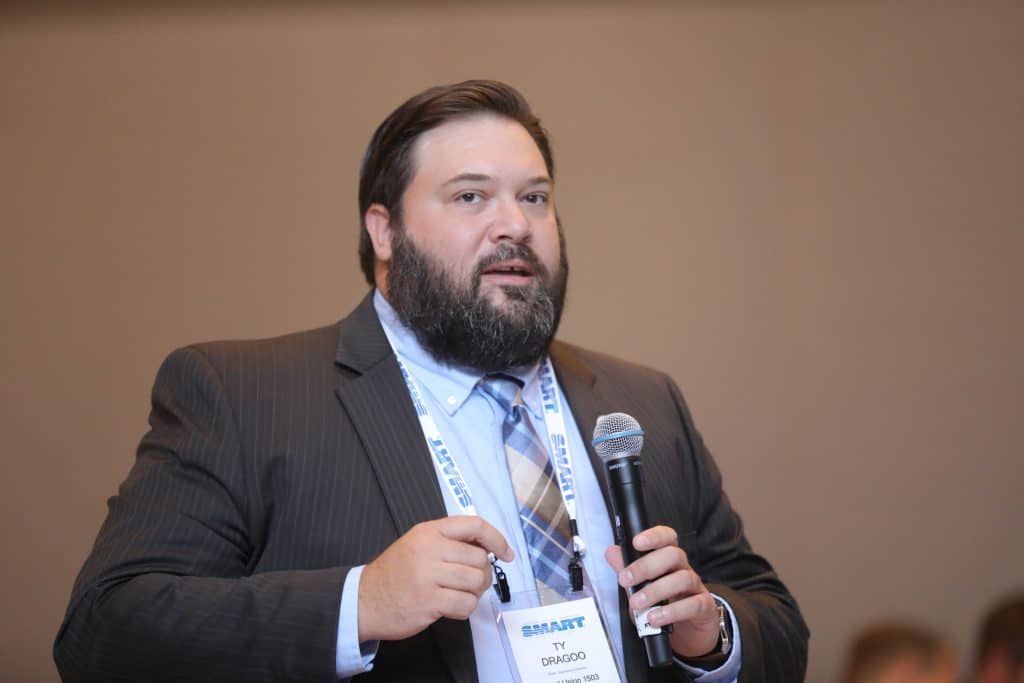Kansas is a state with a population of only 2.94 million people — ranking as the 35th largest state in the country, population-wise. In contrast to that number, according to the American Association of Railroads’ website, Kansas ranks sixth in the nation for distance of rail with 4,252 miles. With 16 railroad companies operating in the state and this high density of rail, the industry plays a very important role in the landscape of the Jayhawk State and keeps SMART-TD’s Kansas State Legislative Director (SLD) Ty Dragoo very busy.

Currently, Brother Dragoo is working for the good of our membership as well as the people of Kansas by fighting to pass Senate Bill 215, known as the Kansas Rail Safety Improvement Act (KRSIA). In SB 215, Dragoo and bill sponsor Sen. Carolyn McGinn (R-31st District) have built an aggressive package aimed at reversing the effects Precision Scheduled Railroading (PSR) has had on the highly rail-dependent state. The railroad lobby has strong roots in Kansas and SB 271 was introduced with components of SB 215. While SB 215 is the goal, SB271 is the start in a state that has not seen any railroad safety laws passed in five decades.
Sen. McGinn introduced SB 215 in the second week of February, and it was quickly assigned to the Senate Transportation Committee. To date, SB 215 has sat on a shelf in committee having not been given a hearing for five weeks while UP scattered rail cars across the state in a pair of high-profile derailments. However, through negotiations with legislative leadership Dragoo has secured hearings on SB 271 and action is anticipated.
SB 271 will limit freight trains to a length of 8,500 feet within the state’s borders.
In order to prevent accidents at rail crossings, the bill also creates a minimum distance between road crossings and standing equipment left in sidings. The bill states that rail cars in a siding can’t be any closer than 250 feet to the edge of a road. With this 250-foot gap, the bill seeks to create clear lines of sight for motorists to be able to adequately determine if the crossing is safe to use without rail cars impairing their view of potential oncoming trains.
All in all, this bill being backed by SMART-TD is positioned to bring about significant improvement to the quality of life for Kansas rail crews. Ending the era of unrealistically large train consists, reducing the number of critical incidents at road crossings make for an impressive list of safety enhancements in a state that has seen its share of rail incidents this month. On March 4 and March 12, two separate incidents involving Union Pacific trains resulted in a combined 31 cars of mixed freight leaving the rails in Riverdale and McPherson, Kan. Though neither of the two derailments were as devastating to the communities as the toxic spill in East Palestine, Ohio, that has been grabbing headlines nationally since early February. Two of the cars in the McPherson derailment did leak denatured alcohol and caused a grass fire.
No one was hurt in either incident and officials have assured both communities that there are no immediate or long-term health threats from these two derailments. Even with this being true, the timing of these incidents has shed light on the importance of Dragoo’s bill.
The facts on the ground dictate that it’s time for the legislators in Topeka to give Brother Dragoo’s legislation strong consideration. Residents and taxpayers throughout Kansas shouldn’t settle for anything less.
It is of the highest importance for all our members in Kansas, along with their family and friends, let their state senators know that they demand action on behalf of the Transportation Committee. They need to act as soon as possible. Please follow the link provided to SMART-TD’s Legislative Action Center and enter your address. It will give you the contact information of all your state and federal representatives, then click on your state senator and take a moment to send him/her even a 2–3-line message that encourages them to take up the issues of SB 271.
The time is now to push for the passage of rail safety legislation across our country. Please put your shoulder to the wheel and help SMART-TD’s legislative department in Kansas and in every other state do the work to safeguard our brothers and sisters as well as the communities we all live in.



